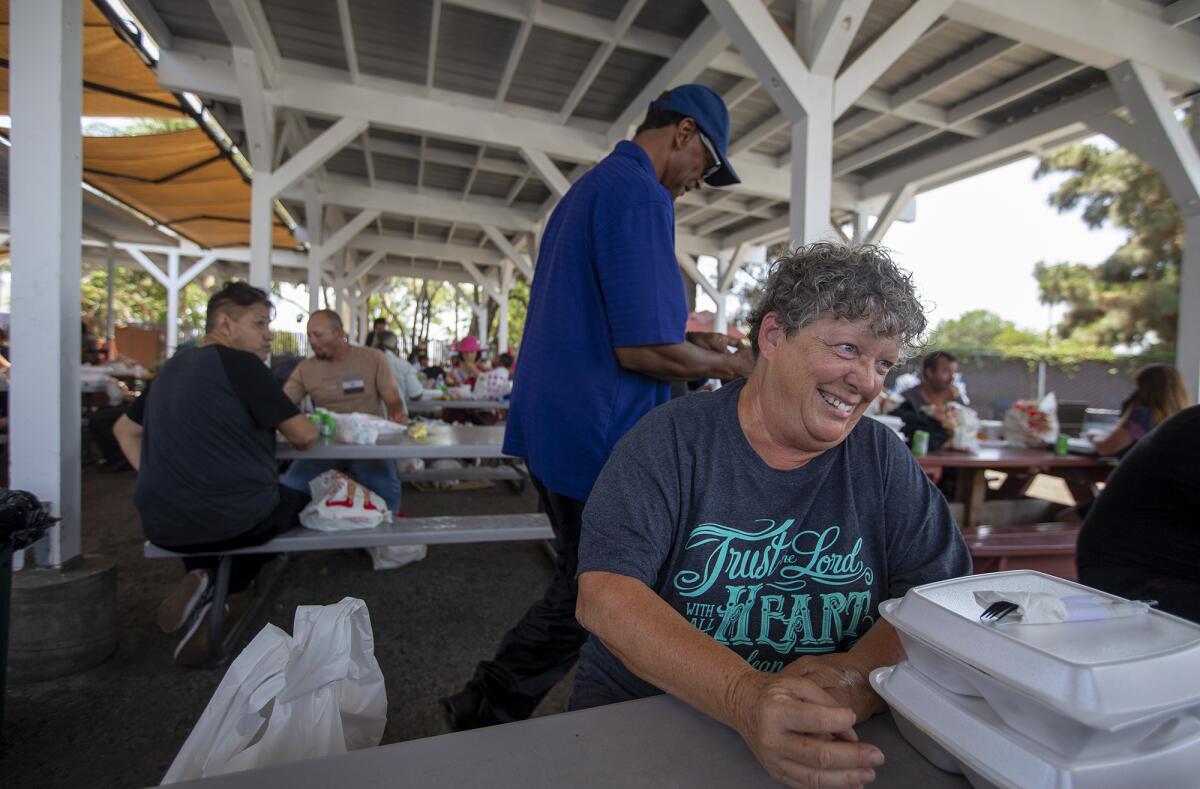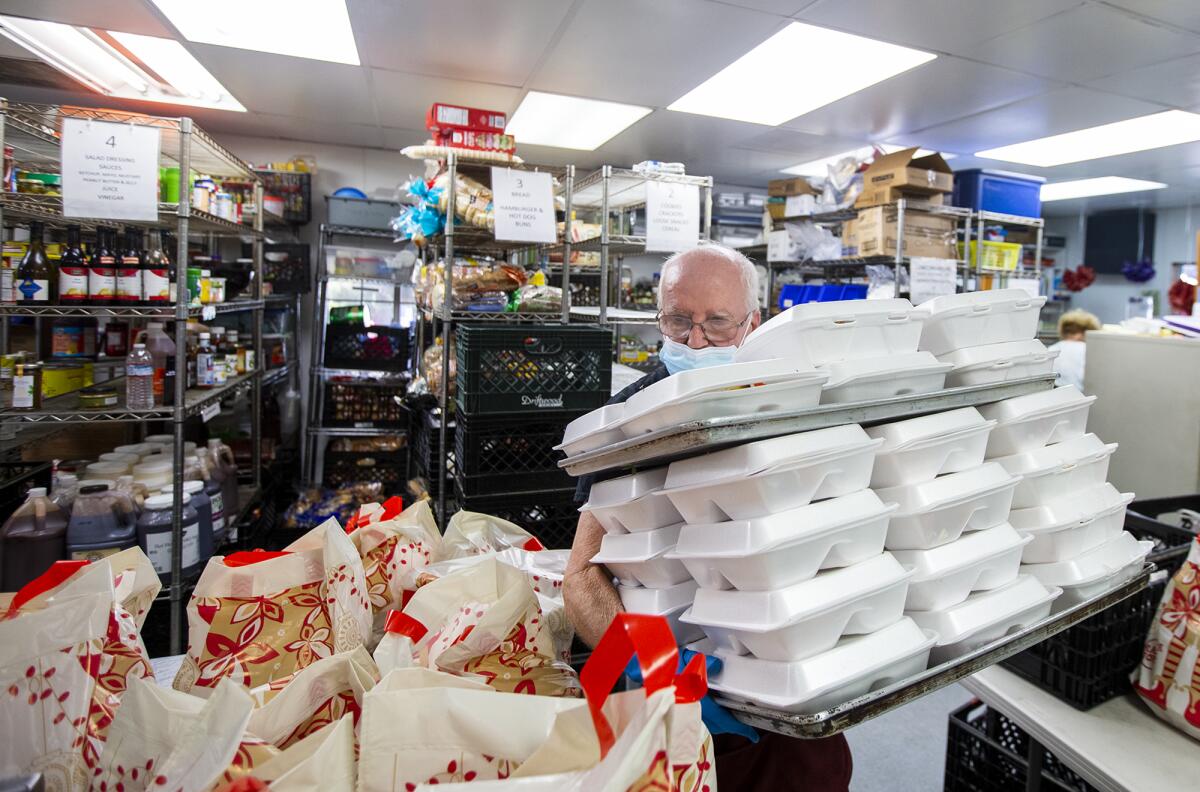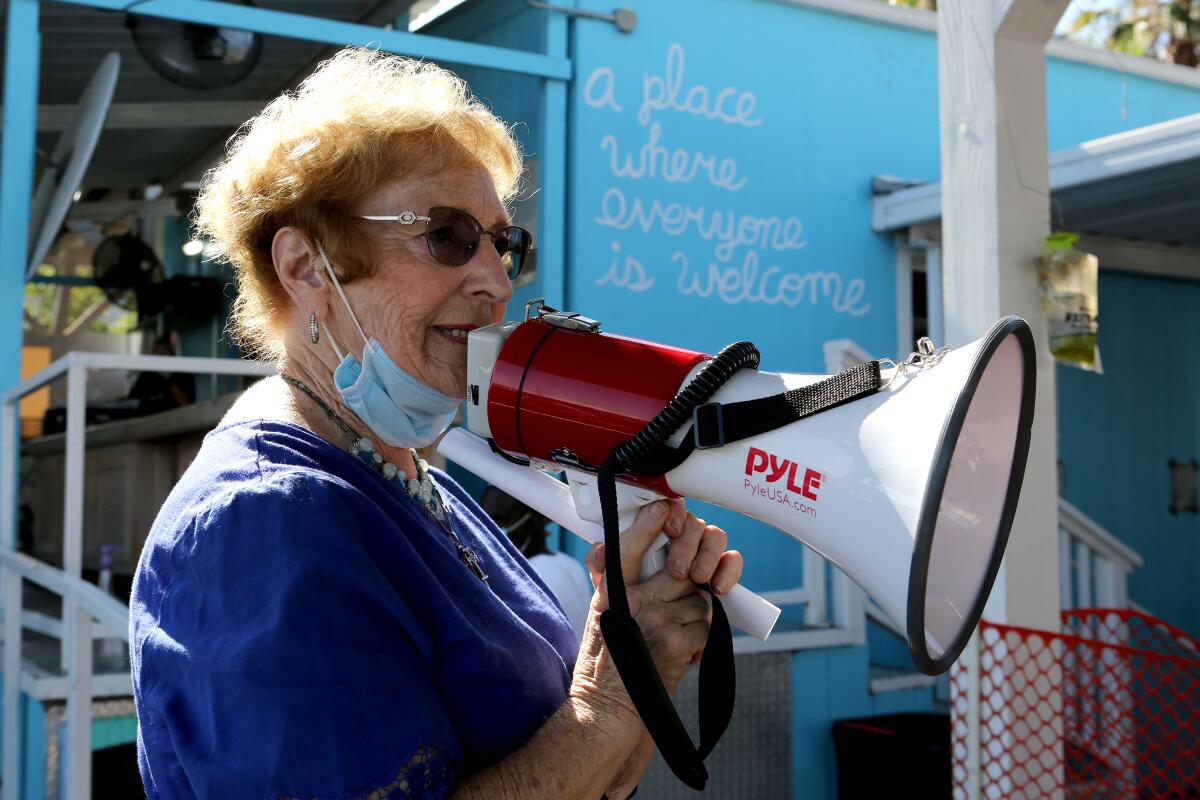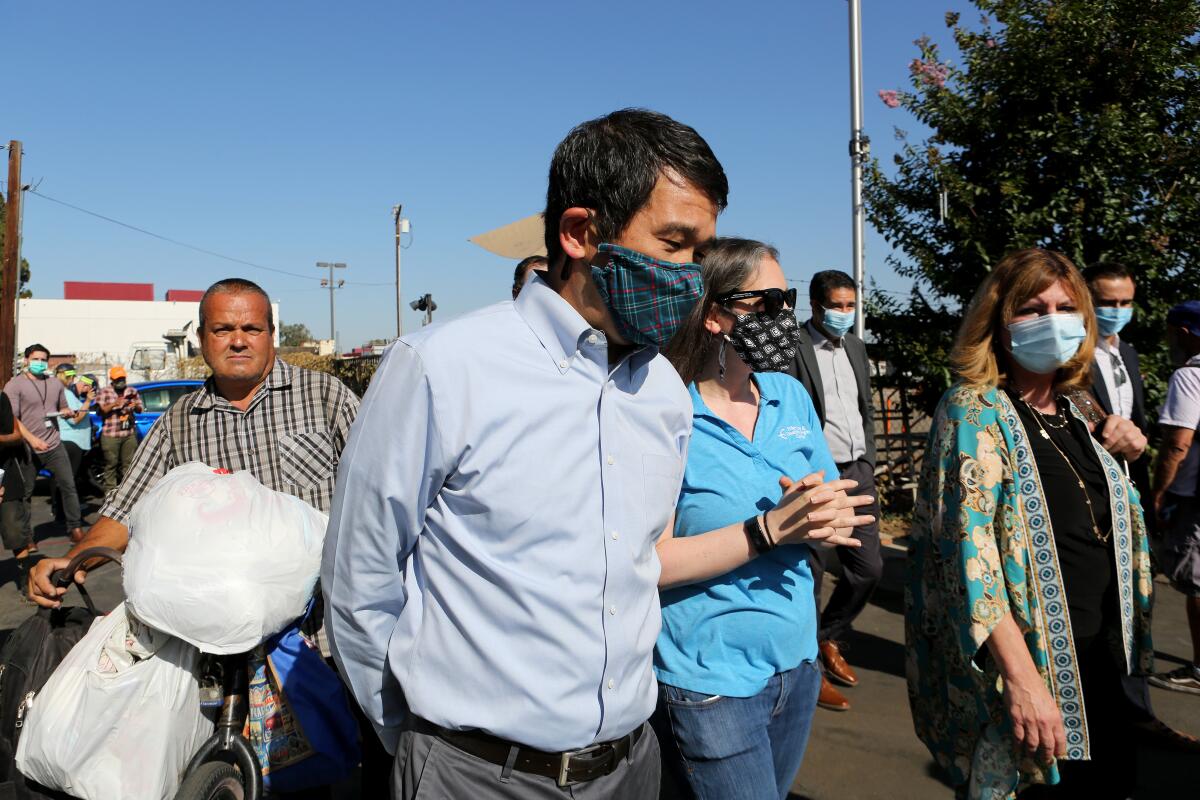Mary’s Kitchen can stay open for now after judge grants temporary restraining order

The city of Orange will not be able to forcibly shut down Mary’s Kitchen for now after a judge granted a temporary restraining order a day before the homeless nonprofit was required to clear out of its current location.
An attorney representing Mary’s Kitchen filed the order earlier this week to prevent the city from leaving hundreds of homeless people without necessary resources.
In his decision, U.S. District Judge David O. Carter said the requested order established that clients of Mary’s Kitchen “are likely to suffer irreparable harm in the absence of preliminary relief.”
“Without a TRO, Mary’s Kitchen will be shut down on Sept. 18, 2021 after 36 years of offering services to individuals impacted by homelessness,” Carter said in his decision. “The organization will lose its physical location and tens of thousands of dollars of infrastructure investments. In addition, the individual plaintiffs allege that they rely on Mary’s Kitchen for food, daily hygiene and medical services. Without Mary’s Kitchen, the individual plaintiffs will likely suffer substantial hardship to obtain these services. These dangers are compounded as the COVID-19 pandemic continues.”
Orange spokesman Paul Sitkoff provided an emailed response on Friday.
“The city will comply with the TRO and is working on a response,” he said.
The temporary restraining order will be in effect until at least Sept. 30, when there will be a hearing for a preliminary injunction.
The nonprofit has been fighting to stay open since the city sent Mary’s Kitchen a letter in June terminating its lease three years early, giving the nonprofit until Saturday to move out.
Mary’s Kitchen has been operating in Orange since the mid-1980s and has been at its current location, 517 W. Struck Ave., since 1994.
A nonprofit driven by donations and volunteers, hundreds have come to rely on the various services that Mary’s Kitchen offers, which includes three meals, six days a week, to anyone who seeks them out. Showers and laundry facilities are available, and the nonprofit receives mail for hundreds of people.
The restraining order, filed in the state’s central U.S. District Court on Wednesday, says that the clients of Mary’s Kitchen will be endangered if the nonprofit is closed down because it’s the only homeless service provider in the city for adults without minor children.
“The city issued the termination notice without authority, or any opportunity for pre-deprivation due process, and on an unconstitutional basis,” the legal document says. “If the city is permitted to shut down Mary’s Kitchen, significant harm will occur to the hundreds of seniors, veterans and people with disabilities plaintiff serves and for whom this is the only place in the city to access basic hygiene facilities and sustenance, receive their benefits and other important mail and, critically, the only place in the city to find some protection from the elements during the day.”
The city contends that the nonprofit has become a magnet for crime and doesn’t fit into a continuum of care approach to solving homelessness, identified as a “comprehensive regional” strategy.
During a City Council meeting on Tuesday night, Mayor Mark Murphy and council members Chip Monaco and Jon Dumitru made remarks about the increased crime on the street where Mary’s Kitchen is located.
“A civil society requires rules and laws, as well as compassion,” Monaco said. “Mary’s Kitchen has become a place where compassion overlooks the law.”
Monaco said he is confident that the city will prevail against any lawsuits. Meanwhile, Murphy was steadfast in his support of the closure of Mary’s Kitchen.
“Mary’s Kitchen will close and we will start over with a clean slate and figure out how to go next and where to go next,” Murphy said.
Dozens of supporters of Mary’s Kitchen spoke out in support of the nonprofit at this week’s meeting prior to the council members’ responses.

Brooke Weitzman, the attorney representing Mary’s Kitchen, has maintained that the city and police seem to be unfairly blaming Mary’s Kitchen for crimes that are being committed on the street where the nonprofit is located, rather than solely the calls for service within the nonprofit’s walls.
“They seem to be defining Mary’s Kitchen area as the street, the police department and the industrial area,” she said.
Weitzman pointed out that Mary’s Kitchen works with a professional security company. Security vehicles are present and a guard keeps track of whoever enters the nonprofit’s grounds, she said. Mary’s Kitchen complied with requests from the city in the past to install security cameras and hire the security guard. Gloria Suess, who leads the nonprofit, said that it has a navigator to help connect homeless people to services.
The temporary restraining order also mentions that Mary’s Kitchen sought to expand its services and become a navigation center to help connect its homeless clients with housing, but the city was not receptive.
The restraining order comes on the heels of a lawsuit Weitzman filed last week citing violations of California’s housing laws, the Americans with Disabilities Act, the California Environmental Quality Act and several constitutional infringements.
The lawsuit contends that the city has failed to provide adequate housing and shelter for its homeless population and is now seeking to shut down the only service provider in Orange focusing on homeless adults who don’t have children. The nonprofit serves about 330 people, with the majority of them suffering from at least one disability, the lawsuit says.
“There is no other provider serving this community in the city, so the migration of unhoused seniors, disabled and economically marginalized persons experiencing homelessness is inevitable,” the lawsuit reads. “More importantly, many will likely die if the city’s only homeless service provider is closed.”

The lawsuit pointed out that there were record death rates of homeless people in Orange when Mary’s Kitchen wasn’t able to provide its full services during the pandemic, with six people per month in July and September 2020. Those rates dropped significantly, between zero and one deaths per month, when the nonprofit was fully open.
“The brief daily respite provided by Mary’s Kitchen allows people to take steps toward a more secure future,” the lawsuit says. “For veterans, it means accessing the assistance earned by their service to the nation. For women, it means not living with the constant vulnerability of sexual assault on the streets for a few hours a day. For people with disabilities, it means a place to accommodate their needs without judgment. For others, it means some rest and a shower, medical and social services, a modicum of stability and, with luck, reunite with family.”
The lawsuit also says that many cities in Orange County have gotten serious about tackling homelessness, focusing on evidence-based approaches to solving the problem. But, Orange has not done this. The temporary restraining order mentions that the city provides no services for the homeless. The order says that there are a few county-run programs, but they are limited. They include a small shelter for families with children from around Orange County and the Be Well OC campus, a medical facility for people suffering with mental illness.
“The city has no outreach programs, no healthcare staff, no contract agency — only law enforcement,” the lawsuit says.
Orange spokesman Paul Sitkoff said Thursday that the city is currently preparing a response to the lawsuit.
“Our city’s counsel has reviewed the filing and believes it to be without merit,” he said. “... As far as we are concerned, this does not alter the situation, and we expect Mary’s Kitchen to vacate the city property no later than Saturday, Sept. 18.”
He said he could not comment any further on the matter.

Since the announcement of its closure, Mary’s Kitchen has amassed a number of supporters, both politically and in the community.
Last week, the American Civil Liberties Union of Southern California along with Weitzman’s firm sent a letter to the Orange City Council and other city staff, asserting that the city violated the Brown Act when it voted to terminate the lease of Mary’s Kitchen without prior notice to the public.
The letter points out that the city ignored important strictures of the Brown Act, requiring city council meetings to be “open and public,” a prohibition against taking “action by secret ballot” and requiring all items to be posted 72 hours before a meeting. The ACLU is also requesting that records created during the closed session meeting when the termination was approved, be made publicly available, in accordance with the California Public Records Act.
“The Orange City Council’s recent actions violate the public’s right of government access in an important community issue, implicating — at minimum — human dignity, public health, and city transparency,” the letter says.
Other support has been garnered from the community, with an online petition to save Mary’s Kitchen gathering almost 8,000 signatures. State Sen. Dave Min and Assemblywoman Sharon Quirk-Silva have also come to the defense of the nonprofit.
On Thursday, Min sent a letter to the Orange City Council voicing his opposition to the closure of Mary’s Kitchen.
“I write to you today to express my strongest opposition to your planned eviction of Mary’s Kitchen, a longstanding local institution that represents the best of Orange County’s values in serving those who are most vulnerable,” Min says in the letter. “At a time when our community is still struggling to navigate through the public health, mental health, and economic challenges created by the COVID-19 pandemic, I find it unconscionable that the city of Orange would eliminate one of its major providers of services for the unhoused, effectively passing this responsibility on to its neighboring cities.
“Your decision will exacerbate our regional homelessness crisis, place greater strain on our frontline responders and healthcare workers, and harm and likely kill some of those affected.”
UPDATS
Updates
4:00 p.m. Sept. 17, 2021: This story was updated after a judge granted a temporary restraining order on Friday.
All the latest on Orange County from Orange County.
Get our free TimesOC newsletter.
You may occasionally receive promotional content from the Daily Pilot.




